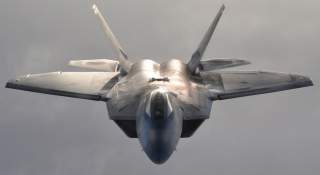Are China and America Destined for War?
Xi Jinping has become more intransigent and assertive over promoting Beijing's self-perceived national interests while Trump has shown a new US hostility toward China. So, does this really mean war?
Are Xi’s China and Trump’s America on a collision course toward war?
It may certainly feel that way sometime. China under Xi Jinping has become more intransigent and more assertive – aggressive even – when it comes to promoting its self-perceived national interests. This is seen in its push for such China-centric initiatives as the Asian Infrastructure Investment Bank (AIIB) and the “One Belt/One Road” plan.
Nowhere is this assertiveness more evident, however, than when it comes to Beijing’s claims of “indisputable sovereignty” over much of the South China Sea. Moreover, this increasingly volatile rhetoric is being matched with increasingly provocative acts in adjacent seas and airspaces, from stalking the USNS Impeccable in March 2009, harassing Philippine and Vietnamese fishing boats, establishing the Sansha administrative prefecture and garrison within the Paracel and Spratly islands, and, finally, constructing a number of artificial islands on various reefs – including several with runways – in the Spratlys, in contravention of international law.
The US response – which, admittedly, predates the Trump presidency – has been restrained but equally emphatic. In particular, the US military has conducted a number of naval and aerial FONOPs (“freedom of navigation operations”) in the South China Sea, in order to demonstrate that Washington does not recognize China’s unilateral assertions of sovereignty. Other US allies, particularly Australia and Japan, have conducted similar patrols in the region.
Nevertheless, until this year, both sides seemed to strive to restrain their efforts. During the latter half of 2016, for example, the US Navy conducted only one FONOP in the South China Sea. At the same time, Chinese island-building – particularly around the disputed Scarborough Shoal, took a breather.
The Trump Effect:
Trump’s upset election victory and subsequent inauguration does not auger well for future Sino-American relations, however. In the first place, Trump’s bewildering cozying-up to Putin raises the likelihood that China will be branded as the peer-competitor “Public Enemy No. 1” by the new administration. Trump had little good to say about China during his campaign, accusing Beijing of being a job-stealer and currency-manipulator. One of his first acts as president-elect was to take a pre-arranged phone call from Taiwan President Tsai Ing-Wen, followed up by Trump’s initial flirtation with a “two-China” policy.
Other members of his cabinet seemed to echo a new hostility toward China. Rex Tillerson, Trump’s nominee for Secretary of State, asserted during his confirmation hearings that the US might somehow try to block Chinese access to its new artificial islands in the Spratlys. “We’re going to have to send China,” he said, “a clear signal that, first, the island-building stops and, second, your access to those islands also is not going to be allowed,” adding that “they are taking territory or control or declaring control of territories that are not rightfully China’s.”
Perhaps so, but the specter of how the US would prevent China from accessing these islands is terrifying. A naval blockade? Turning back aircraft – by force, if necessary? Both actions would be tantamount to a declaration of war against China.
Fortunately, Tillerson has apparently abandoned this line of thinking, and the Trump administration has been preoccupied with other policy initiatives, particularly his botched travel ban. And Secretary of Defense James Mattis has said that the emphasis should be on diplomacy and not confrontation when it comes to settling disputes in the South China Sea (it’s a bit frightening, by the way, that the sole voice of reason inside the Trump administration would be an former four-star Marine Corps general).
Not yet “Peace in Our Time”:
Nevertheless, Trump’s administration has not abandoned its hardline altogether. Steve Bannon, Trump’s advisor, said only months ago that there is “no doubt” that the US and China will go to war in the South China Sea.
At the same time, the Obama-initiated “pivot to Asia” has been by no means abandoned, and the US military buildup in Asia is continuing. For instance, the US is deploying long-range missiles defenses – the so-called Terminal High-Altitude Air Defense (THAAD) system – to South Korea, ostensibly arrayed against North Korea but which could be used to counter Chinese missiles.
China’s response has been to turn up the rhetoric. On the day of Trump’s inauguration, the Chinese military posted a commentary on its official website stating that the likelihood of war with the US has become “more real.” According the South China Morning Post, the commentary asserted that “’A war within [Trump’s] term’ or ‘war breaking out tonight’ are not just slogans, they are becoming a practical reality.”
Everyone’s a Victim Here:
Ultimately, what could drive conflict between Xi’s China and Trump’s America is a similarly held perception in both countries being somehow victims. Beijing has long promoted the idea that it has been oppressed and constrained by foreign powers, and that this therefore entitles it to special consideration. An “official narrative” of humiliation by Western powers is particularly driving a new Chinese populist-nationalist foreign policy.
But now the US, under Trump, is playing a similar victimhood card. Trump won election by arguing that the US has been made a sucker by foreign powers, and his response is to raise the country’s military profile and be more intransigent and demanding when it comes to trade and international relations.
Such mutually held attitudes do not bode well for US-Chinese relations. If everyone is the victim, then no one feels the need to make concessions. Just the opposite, in fact: they feel that they deserve indulgences and dispensations. This is not a good way to avoid conflict.
Richard A. Bitzinger is a Senior Fellow and Coordinator of the Military Transformations Program at the S.Rajaratnam School of International Studies, Nanyang Technological University, Singapore. The opinions expressed here are his own.
This first appeared in AsiaTimes here.

